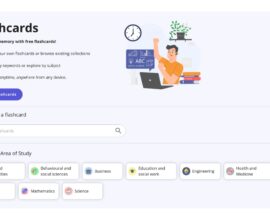Our Top 10 Suggestions for Improving Your Grades Faster
After exam and assessment season, it’s normal to look at your test scores and feel like you could be doing better. Sometimes you’re coming up to the end of the semester and need a way to boost your average on end-of-term assignments, and sometimes you’re trying to find a way to turn those credits into distinctions. Maybe your study habits aren’t quite as robust as they used to be.
That’s why we’ve put together this list of tips and tricks for students who want to swiftly improve their grades.
1. Supercharge Your Note Taking
Writing things down doesn’t just give you an option to read later. It helps to cement the ideas in your mind and improves your memory recall. The critical thing to remember when taking your own notes is that you’re planning to use them later on.
Take good notes during lectures, and be sure that they’re taken in such a way as to be legible, easy to understand, and easy to use.
When taking notes, you can opt to save time by using the Outline Method. This means writing a heading for each topic, and writing bullet points underneath.
After class, be sure to review your notes and organise them as a regular part of your study schedule. Studies show that students who don’t review their notes typically forget 40 per cent of information learned after the first 24 hours, and 60 per cent after 48 hours.
2. Repetition Rules
Bruce Lee once said “I fear not the man who has practiced 10,000 kicks once, but I fear the man who has practiced one kick 10,000 times.”
This is true for studying, too! A good study schedule acknowledges the importance of repetition. If you regularly review your notes, test yourself using study materials, and examine your own knowledge, you’ll improve your marks considerably.
Repetition over time is the best way to improve your skills and confidence, and this is as true of getting good grades as it is of becoming a martial arts master.
3. Attending Class Regularly
This one sounds obvious, but students with poor attendance tend to also have poor grades. Conversely, students with consistent, timely attendance get consistently good grades. Your teacher, lecturer, or tutor is always there to help you learn. To be the best student you can be, making sure you’re regularly attending all your classes is a great way to significantly improve your academic performance.
Make sure that you’re participating in class, too, because active discussion and engagement often help improve your understanding of the subject in more detail. Talk to your teacher and don’t be afraid to ask questions during or after class!
It’s rare in later life to find such a concentrated font of knowledge in an area that you’re actively trying to gather knowledge in.
The best students attend classes regularly, and when you’re in class, pay attention. Take notes as above and don’t let yourself get distracted. This helps take the pressure off when it’s time to prepare for exams.
4. Extracurricular Activities Can Help
It might seem counterintuitive at first, but our brains need rest as much as our bodies do. Focusing 100% of your energy on studying might feel productive, but it actually compromises your effectiveness.
Your brain needs time to organise and reflect on what you’ve learned over the course of the day. Taking up extracurricular activities, like playing soccer with friends or a regular games night, will take your mind off study, allow your brain to consolidate the information you’ve learned, and help improve your marks in the long term. Additionally, you’ll feel less anxious coming back to study again, knowing that you’ve taken time to unwind and process your learnings for the day.
5. Take Frequent, Deliberate Breaks
As impressive as it sounds to cram all your studying in marathon 8-hour bursts, human beings simply aren’t built that way. Time management is a key skill and it’s one well worth developing now, to help you get higher grades and set positive habits early on.
Most of us can only operate at peak performance and concentrate well for 30 to 40 minutes at a time.
When you’re planning your study sessions, make sure to get up and move away from your study space every 30 or 40 minutes.
Take 5 to 10 minutes to walk around, have a glass of water or a snack, and stretch. Taking regular breaks helps to reduce stress, improves recall, and will, over time, help to improve your marks. Balance is key!
6. Turn Study Into Small Chunks
It’s tempting to try and cram before exams, but consider looking at your revision like it’s a seven-kilo novelty steak like in that episode of The Simpsons.
You could cook it up all at once and eat the whole thing in one go, but you’ll probably fill up early at best, and make yourself sick at worst.
If, instead, you cooked and ate a smaller amount at a time, you’ll probably end up finishing the whole thing, and enjoying it more, too.
Rather than cramming before exams or churning out 3,000-word essays the night before they’re due, consider breaking them up into smaller, more manageable pieces that allow you to focus more deeply, understand the subject matter more thoroughly and get more out of your study sessions.
Do your essay 500 words at a time over six days. Study one chapter, or one page, at a time.
7. Consider Summer School For Good Grades
In Australia, we tend to have long, luxurious summer holidays. You could use this as a chance to get ahead of your fellow students by enrolling in summer school, taking an intensive course over the long holiday, applying for an internship, or joining an additional learning program.
This doesn’t just mean enrolling for December. You could also use the time away from uni to continue studying, reading up for the year ahead and consolidating your knowledge from the year just past.
A self-paced “summer school” isn’t the easiest feat of motivation, but it can prove very helpful to you when uni returns in the autumn.
8. Start Your Homework Assignments Early
This is particularly prevalent for those in the humanities, where essays are long and deep understanding of the course material is expected, but many students struggle with taking the time to break down concepts and learnings for best results. Due dates are not start dates.
When you’re given an essay, don’t wait until the night before it’s due to get started.
Don’t even wait until the week before the due date to start writing assignments.
On the day the assignment is handed to you, work out a plan of attack. Establish how many sources you will become familiar with, how many words you can write per day, and how much time you’ll need for proofreading and referencing.
Get a start early on and, as we mentioned before, chip away at the task in smaller chunks. Starting early also allows you to seek help if you need it within a time frame that’s actually useful. It’s not much good asking for homework help at 3 in the morning the night before your essay is due. Effective planning and time management is one of the best ways to get a good grade on your assessment.
9. Make the Most of Online Study Resources
You might not be using study materials or resources, but there are plenty of e-learning tools available online. You can use flashcards and other handy study materials have proven to help your recall and consolidate your knowledge, find detailed explanations in video lectures and prepare for upcoming exams using test prep tools.
Online study apps are an accessible and convenient way for you to boost your marks, and since they’re available online, can be used 24/7 to structure your study in a way that’s most effective for you.
10. If in Doubt, Consult a Tutor
Last but not least, another proven way to boost your marks is to talk to someone and get a bit of extra help from a tutor. Tutors, whether they are from your university or provided by a tutoring service, are great expert resources who will help you stay motivated, keep your tasks on track, and want you to succeed.
Sometimes, having a private tutor dedicated to helping you understand the material and improving your marks is all you need to stop the slip. There’s nothing wrong with asking for help when you need it, and chances are they’ll be more than happy to help you in the right direction.






